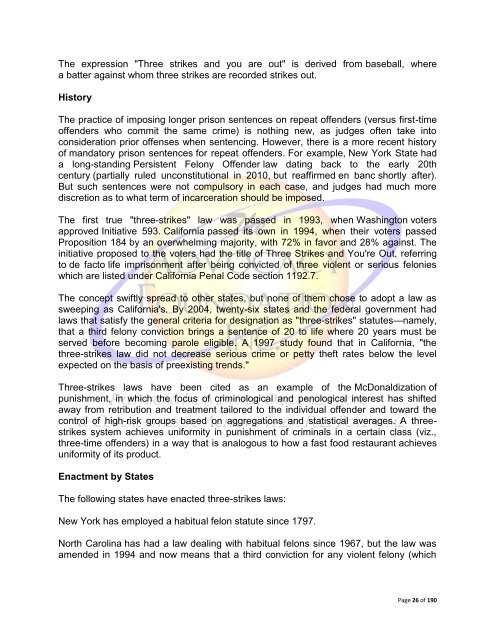The Violent Crime and Law Enforcement Act of 1994
The Violent Crime and Law Enforcement Act of 1994
The Violent Crime and Law Enforcement Act of 1994
You also want an ePaper? Increase the reach of your titles
YUMPU automatically turns print PDFs into web optimized ePapers that Google loves.
<strong>The</strong> expression "Three strikes <strong>and</strong> you are out" is derived from baseball, where<br />
a batter against whom three strikes are recorded strikes out.<br />
History<br />
<strong>The</strong> practice <strong>of</strong> imposing longer prison sentences on repeat <strong>of</strong>fenders (versus first-time<br />
<strong>of</strong>fenders who commit the same crime) is nothing new, as judges <strong>of</strong>ten take into<br />
consideration prior <strong>of</strong>fenses when sentencing. However, there is a more recent history<br />
<strong>of</strong> m<strong>and</strong>atory prison sentences for repeat <strong>of</strong>fenders. For example, New York State had<br />
a long-st<strong>and</strong>ing Persistent Felony Offender law dating back to the early 20th<br />
century (partially ruled unconstitutional in 2010, but reaffirmed en banc shortly after).<br />
But such sentences were not compulsory in each case, <strong>and</strong> judges had much more<br />
discretion as to what term <strong>of</strong> incarceration should be imposed.<br />
<strong>The</strong> first true "three-strikes" law was passed in 1993, when Washington voters<br />
approved Initiative 593. California passed its own in <strong>1994</strong>, when their voters passed<br />
Proposition 184 by an overwhelming majority, with 72% in favor <strong>and</strong> 28% against. <strong>The</strong><br />
initiative proposed to the voters had the title <strong>of</strong> Three Strikes <strong>and</strong> You're Out, referring<br />
to de facto life imprisonment after being convicted <strong>of</strong> three violent or serious felonies<br />
which are listed under California Penal Code section 1192.7.<br />
<strong>The</strong> concept swiftly spread to other states, but none <strong>of</strong> them chose to adopt a law as<br />
sweeping as California's. By 2004, twenty-six states <strong>and</strong> the federal government had<br />
laws that satisfy the general criteria for designation as "three-strikes" statutes—namely,<br />
that a third felony conviction brings a sentence <strong>of</strong> 20 to life where 20 years must be<br />
served before becoming parole eligible. A 1997 study found that in California, "the<br />
three-strikes law did not decrease serious crime or petty theft rates below the level<br />
expected on the basis <strong>of</strong> preexisting trends."<br />
Three-strikes laws have been cited as an example <strong>of</strong> the McDonaldization <strong>of</strong><br />
punishment, in which the focus <strong>of</strong> criminological <strong>and</strong> penological interest has shifted<br />
away from retribution <strong>and</strong> treatment tailored to the individual <strong>of</strong>fender <strong>and</strong> toward the<br />
control <strong>of</strong> high-risk groups based on aggregations <strong>and</strong> statistical averages. A threestrikes<br />
system achieves uniformity in punishment <strong>of</strong> criminals in a certain class (viz.,<br />
three-time <strong>of</strong>fenders) in a way that is analogous to how a fast food restaurant achieves<br />
uniformity <strong>of</strong> its product.<br />
Enactment by States<br />
<strong>The</strong> following states have enacted three-strikes laws:<br />
New York has employed a habitual felon statute since 1797.<br />
North Carolina has had a law dealing with habitual felons since 1967, but the law was<br />
amended in <strong>1994</strong> <strong>and</strong> now means that a third conviction for any violent felony (which<br />
Page 26 <strong>of</strong> 190
















